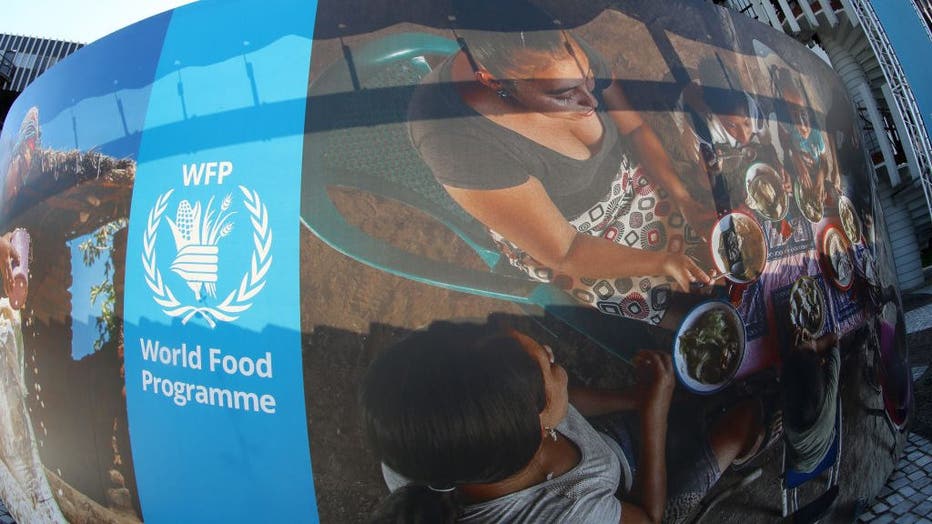Nobel Peace Prize awarded to the World Food Program
NIAMEY, Niger (AP) - The World Food Program won the Nobel Peace Prize on Friday for its efforts to combat hunger in regions facing conflict and hardship at a time when the coronavirus pandemic has driven millions more people to the brink of starvation.
The Rome-based United Nations agency has long specialized in getting assistance to some of the world’s most dangerous and precarious places, from air-dropping food in South Sudan and Syria to creating an emergency delivery service that kept aid flowing even as pandemic restrictions grounded commercial flights.
In announcing the prize, the Norwegian Nobel Committee said it wished “to turn the eyes of the world towards the millions of people who suffer from or face the threat of hunger.”
The committee also said it hopes the prize will highlight the need to strengthen global solidarity and cooperation in an era of go-it-alone nationalism.
RELATED: American poet Louise Glück wins 2020 Nobel Prize in Literature
“We are sending a signal to every nation who raises objections to international cooperation," committee chair Berit Reiss-Andersen said shortly after the award was announced. "We are sending a signal to this type of nationalism where the responsibility for global affairs is not being faced.”
“Multilateral cooperation is absolutely necessary to combat global challenges. And multilateralism seems to have a lack of respect these days,” Reiss-Andersen said.
The award comes as President Donald Trump has pulled the United States out of several U.N. bodies, including the Human Rights Council and UNESCO, the cultural agency. He has also repeatedly criticized the U.N.’s World Health Organization over its handling of the coronavirus pandemic, and his administration has said the United States will leave it next July.
In light of that American pullback, the choice of the World Food Program was particularly notable because the U.S. remains by far its biggest donor, the agency has been run by an American for nearly 40 years, and its current head — who was nominated by Trump's administration — has been a rare recent example of U.S.-led internationalism.
David Beasley, WFP's executive director, said the award rightly goes to his entire team.

“I know I’m not deserving of an award like this — but all the men and women around the world in the World Food Program and our partners who put their lives on the line every day to help those in need, that is inspiring and encouraging,” a giddy Beasley told The Associated Press by phone from Niger.
WFP staffers in Niger greeted Beasley with cheers and applause as he emerged to address a crowd after the announcement. "I didn’t win it, you won it,” he told them.
The Nobel Committee said that the problem of hunger has again become more acute in recent years, not least because the pandemic has added to the hardship already faced by millions of people around the world.
In total, WFP estimates that 690 million people suffer some form of hunger in the world today.
U.N. Secretary-General Antonio Guterres said he was delighted the award went to “the world’s first responder on the frontlines of food insecurity.” It was the ninth award for the U.N. or one of its agencies.
“In a world of plenty, it is unconscionable that hundreds of millions go to bed each night hungry,” Guterres said. “Millions more are now on the precipice of famine due to the COVID-19 pandemic.”
The Nobel Committee called on governments to ensure that WFP and other aid organizations receive the financial support necessary to feed millions in countries such as Yemen, Congo, Nigeria and South Sudan.
On Friday, when the award was announced, Beasley was in Niger, following a visit to neighboring Burkina Faso — two countries in the Sahel region of Africa that her said is “under attack by extremists and climate extremes” and going through “a devastating” time.
RELATED: 2 Americans, 1 British scientist win Nobel medicine prize
A logistics juggernaut, WFP this year created a global emergency delivery service for humanitarian aid. Officials said the unprecedented effort involved nearly 130 countries and was key in ensuring that aid for the pandemic kept flowing in addition to other assistance, like the drugs and vaccines needed to combat other diseases.
There was no shortage of causes or candidates on this year’s list, with 211 individuals and 107 organizations nominated ahead of the Feb. 1 deadline.
The Norwegian Nobel Committee maintains absolute secrecy about whom it favors before the announcement of arguably the world’s most prestigious prize, but WFP had been on the shortlist of Dan Smith, the director of the Stockholm International Peace Research Institute
“The global problem of hunger is increasing and so is the global problem of violent conflict," Smith said. “The World Food Program works at the intersection of those two problems (and) it's going to face an increasing workload in the coming years."
The award comes with a gold medal and a 10-milion krona ($1.1 million) cash prize that is dwarfed by the funding that WFP requires for its work. So far in 2020, the organization has received almost $6.4 billion in cash or goods, with over $2.7 billion coming from the United States.
On Monday, the Nobel Committee awarded the prize for physiology and medicine for discovering the liver-ravaging hepatitis C virus. Tuesday’s prize for physics honored breakthroughs in understanding the mysteries of cosmic black holes, and the chemistry prize on Wednesday went to scientists behind a powerful gene-editing tool. The literature prize was awarded to American poet Louise Glück on Thursday for her “candid and uncompromising” work.
Still to come next week is the prize for outstanding work in the field of economics.
___
Jordans reported from Berlin. Associated Press journalists Karl Ritter, Nicole Winfield, Patricia Thomas in Rome, Vanessa Gera in Warsaw, Poland, Cara Anna in Johannesburg, and Jamey Keaten in Geneva contributed to this report.

